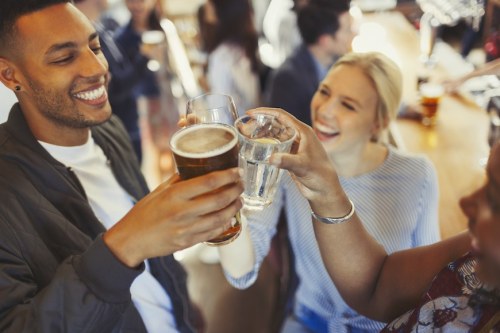Our editors independently select these products. Making a purchase through our links may earn Well+Good a commission
Nothing makes you realize how central alcohol is to the life of a social twenty-something college student quite like being a social twenty-something college student (hint: it me). In my case though, the hangovers joked about in group texts eventually stopped being funny, and the previous nights’ antics bragged about the next morning—over mimosas, natch—lost their luster. After waking up one too many Saturday morning feeling lethargic and surrounded by empty containers of Ben and Jerry’s (the healthier-for-you edition, but still) and bodega cheese fries, I decided to rethink my relationship with alcohol.
As someone who has PCOS, alcohol is the last thing I should be reaching for to benefit my health. Plus, given that I’m recovering from orthorexia, the obsessing about cocktail calories I finding myself doing after a night of drinks doesn’t do me any favors either. Whereas many people get over hangovers with the help of green juice and a nap, my docs let me know that drinking puts my physical and mental health at serious stake. So, to help me shift my lifestyle, I called on woo-woo goddess Ruby Warrington, author of Sober Curious and founder of online magazine The Numinous, to be my spirit guide.
You’re probably familiar with the concept of sobriety; maybe you even tried (and possibly failed) Dry January. Sober curiosity, on the other hand is less rigid—more like, say, moist January. “Being sober curious means literally just choosing to question every impulse, every invitation, or every expectation to drink, rather than just kind of going along with the dominant drinking culture,” Warrington tells me. “And for some people, that line of questioning may mean that you choose to abstain from alcohol completely, and for other people it may just mean more mindful and conscious drinking choices.”
“Sober curious means choosing to question every impulse, every invitation, or every expectation to drink, rather than just kind of going along with the dominant drinking culture. That line of questioning may mean that you abstain from alcohol completely, or it just might mean more mindful and conscious drinking choices.” —Ruby Warrington, Sober Curious author
Well, as someone who had gotten used to mindlessly drinking, I felt intrigued and ready to take on the challenge of the sober-curious lifestyle. Now, about a month in to my journey, I’m more productive and happy. Alcohol is a depressant that impairs physical and psychological activity, leading to feelings of sluggishness and lack of motivation after drinking too much of it. So now that I’ve cut back on cocktails, I’m noticing better quality zzz’s, waking up feeling refreshed, and I don’t have any stubborn headaches or nausea that keep me from tackling my to-do list. Plus, I’ve noticed fewer PCOS-related symptoms cropping up, like acne and mood swings. Even stubborn orthorexia habits, like obsessing over calories, have been less frequent and intrusive since I’m not doing as much late-night snacking after sipping. But perhaps the best part of this whole journey is that I actually enjoy my drink when I decide to have one. Long gone are the nights of haphazardly pounding vodka sodas and hating every second of it.
Armed with Warrington’s tips, I now approach every situation involving alcohol with a questioning mind to make sure I’m doing right by myself. I frequently check in with myself about why I’m choosing to have a drink: Is it that I’m not comfortable without a drink? Mostly, I work to understand what I really want in a given moment.
Warrington also advises cluing in friends and loved ones about your sober-curious journey, because they’ll be able to help you stay accountable through the lens of care and support—just like a gym buddy or a work wife might. “Having people to share your experience with is one of the most powerful ways you can feel supported and held and not so alone,” she says.
To that point, I’m looking forward to scheduling more coffee dates and morning cycling sessions with friends (followed by brunch with mimosas every once in a while, because #balance) and fewer late-night boozy parties that end with my two frenemies, Ben and Jerry. With all the benefits I’ve reaped just after one month of drinking more mindfully, my only question is, why didn’t I start this sooner?
Looking to swap some (or all) of your cocktails to mocktails? Test out these 22 recipes that prove that booze is actually kind of irrelevant. And meet your new sober-curious happy hour BFF: botanical booze.
Sign Up for Our Daily Newsletter
Get all the latest in wellness, trends, food, fitness, beauty, and more delivered right to your inbox.
Got it, you've been added to our email list.










